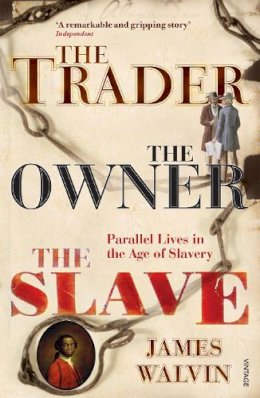26%OFF

Stock image for illustration purposes only - book cover, edition or condition may vary.
The Trader, the Owner, the Slave
Professor James Walvin
€ 17.99
€ 13.40
FREE Delivery in Ireland
Description for The Trader, the Owner, the Slave
Paperback. Examining the lives of three individuals caught up in the enterprise of human enslavement - a trader, an owner and a slave, this book offers an interpretation of the barbaric world of slavery and of its historic end in April 1807. Num Pages: 336 pages, 8 pages b/w plates; 1 map. BIC Classification: HBTS. Category: (G) General (US: Trade). Dimension: 197 x 129 x 20. Weight in Grams: 282.
There has been nothing like Atlantic slavery. Its scope and the ways in which it has shaped the modern world are so far-reaching as to make it ungraspable. By examining the lives of three individuals caught up in the enterprise of human enslavement. James Walvin offers a new and an original interpretation of the barbaric world of slavery and of the historic end to the slave trade in April 1807.
John Newton (1725-1807), author of 'Amazing Grace', was a slave captain who marshalled his human cargoes with a brutality that he looked back on with shame and contrition. Thomas ... Read more
Product Details
Publisher
Vintage United Kingdom
Number of pages
336
Format
Paperback
Publication date
2008
Condition
New
Number of Pages
336
Place of Publication
London, United Kingdom
ISBN
9780712667630
SKU
V9780712667630
Shipping Time
Usually ships in 5 to 9 working days
Ref
99-99
About Professor James Walvin
James Walvin is the Emeritus Professor of History at the University of York. He has published widely on slavery and the slave trade. His book Black and White won the Martin Luther King Memorial Prize and his book on the Quakers was named as a 'Notable Book of the Year' by the New York Times. Walvin's book The People's Game ... Read more
Reviews for The Trader, the Owner, the Slave
Much more than just a catalogue of horrors... James Walvin is extraordinarily alert to the contradictions within the human heart... Walvin is never blind to the horrors of slavery, nor to the responsibility of individuals for their actions. But he recognises that the world was different then and that the institution of slavery encouraged individual acts of evil that would ... Read more
